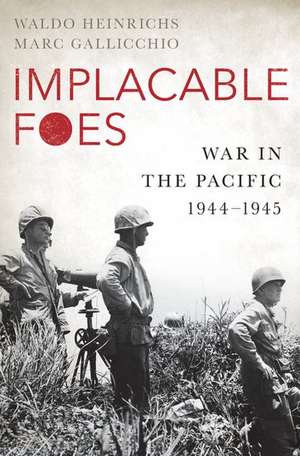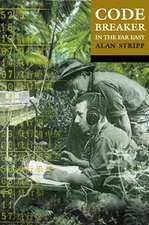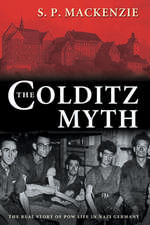Implacable Foes: War in the Pacific, 1944-1945
Autor Waldo Heinrichs, Marc Gallicchioen Limba Engleză Hardback – 24 aug 2017
| Toate formatele și edițiile | Preț | Express |
|---|---|---|
| Paperback (1) | 108.41 lei 10-16 zile | |
| Oxford University Press – 22 aug 2019 | 108.41 lei 10-16 zile | |
| Hardback (1) | 157.92 lei 31-37 zile | |
| Oxford University Press – 24 aug 2017 | 157.92 lei 31-37 zile |
Preț: 157.92 lei
Nou
Puncte Express: 237
Preț estimativ în valută:
30.22€ • 31.64$ • 25.06£
30.22€ • 31.64$ • 25.06£
Carte tipărită la comandă
Livrare economică 29 martie-04 aprilie
Preluare comenzi: 021 569.72.76
Specificații
ISBN-13: 9780190616755
ISBN-10: 019061675X
Pagini: 744
Dimensiuni: 163 x 236 x 56 mm
Greutate: 1.06 kg
Editura: Oxford University Press
Colecția OUP USA
Locul publicării:New York, United States
ISBN-10: 019061675X
Pagini: 744
Dimensiuni: 163 x 236 x 56 mm
Greutate: 1.06 kg
Editura: Oxford University Press
Colecția OUP USA
Locul publicării:New York, United States
Recenzii
This book is a superb piece of military and naval history. It blends the particular and the general, the battlefront and the homefront, the broader political and international and the militarily particular into an eminently readable narrative. It should be indispensable reading for anyone interested in the history of the Second World War.
This book brings to life those final years of World War II right up to the dropping of the atomic bombs over Hiroshima and Nagasaki, evoking not only Japanese policies of desperate defence, but the sometimes spiteful debates on the home-front. Heinrichs and Gallicchio deliver a gripping and provocative narrative that challenges the decision--making of US leaders and explains the consequences of prioritising the European front.
The great strength of Implacable Foes is in its understanding the many dimensions, political, strategic, and tactical, of the American war.
This book's strength undoubtedly lies in its extensive coverage of military operations and the naval activities that supported them.
A valuable and revealing study. For readers familiar with the military campaigns, the book is essential reading for its lucid treatment of the pressures that imperiled critical operations in a truly global war... the contribution of this vital book is its portrait of history as lived desperately in the moment; of the varied troubles that beset planners and commanders in the war's horrific last year; and of the mettle and vision of an American president whom history should underrate no longer. Implacable Foes shows war operations as a human ordeal even at the highest level, fueled by the exhaustible human spirit.
Two great historians have produced this stellar and extremely important book, adding critical new layers to the decision-making process of American leaders approaching the controversial end of the Asia-Pacific War. This is a thoroughly researched, judicious, and very sobering reminder of the complexity and uncertainty of events surrounding the final acts of World War II.
A masterful history destined to be the definitive account of the final two years of America's war with Japan. The authors' comprehensive, original, and highly readable narrative sets new standards for understanding the political, military, and social pressures on U.S. leaders as they simultaneously fought a determined foe, demobilized American armed forces, and prepared for the complex transition to America's postwar domestic economy.
Implacable Foes is a superbly researched work of both original scholarship and synthesis on the last two years of the Pacific War by two eminent and award-winning historians. Their detailed analysis and conclusions will challenge some long-held beliefs about U.S. strategic planning and operations in this conflict while reinforcing others.
In their detailed and insightful analysis of the last year of the Pacific War, Waldo Heinrichs and Marc Gallicchio tie military operations closely with the political, strategic, logistical, and even cultural context to provide a thorough assessment of the war, and they do so without losing any of the inherent drama of events.
This book brings to life those final years of World War II right up to the dropping of the atomic bombs over Hiroshima and Nagasaki, evoking not only Japanese policies of desperate defence, but the sometimes spiteful debates on the home-front. Heinrichs and Gallicchio deliver a gripping and provocative narrative that challenges the decision--making of US leaders and explains the consequences of prioritising the European front.
The great strength of Implacable Foes is in its understanding the many dimensions, political, strategic, and tactical, of the American war.
This book's strength undoubtedly lies in its extensive coverage of military operations and the naval activities that supported them.
A valuable and revealing study. For readers familiar with the military campaigns, the book is essential reading for its lucid treatment of the pressures that imperiled critical operations in a truly global war... the contribution of this vital book is its portrait of history as lived desperately in the moment; of the varied troubles that beset planners and commanders in the war's horrific last year; and of the mettle and vision of an American president whom history should underrate no longer. Implacable Foes shows war operations as a human ordeal even at the highest level, fueled by the exhaustible human spirit.
Two great historians have produced this stellar and extremely important book, adding critical new layers to the decision-making process of American leaders approaching the controversial end of the Asia-Pacific War. This is a thoroughly researched, judicious, and very sobering reminder of the complexity and uncertainty of events surrounding the final acts of World War II.
A masterful history destined to be the definitive account of the final two years of America's war with Japan. The authors' comprehensive, original, and highly readable narrative sets new standards for understanding the political, military, and social pressures on U.S. leaders as they simultaneously fought a determined foe, demobilized American armed forces, and prepared for the complex transition to America's postwar domestic economy.
Implacable Foes is a superbly researched work of both original scholarship and synthesis on the last two years of the Pacific War by two eminent and award-winning historians. Their detailed analysis and conclusions will challenge some long-held beliefs about U.S. strategic planning and operations in this conflict while reinforcing others.
In their detailed and insightful analysis of the last year of the Pacific War, Waldo Heinrichs and Marc Gallicchio tie military operations closely with the political, strategic, logistical, and even cultural context to provide a thorough assessment of the war, and they do so without losing any of the inherent drama of events.
Notă biografică
Waldo Heinrichs is Dwight E. Stanford Professor Emeritus at San Diego State University. He is the author of American Ambassador: Joseph C. Grew and the Development of the United States Diplomatic Tradition, which won the Allan Nevins Prize.Marc Gallicchio is a Professor of History at Villanova University and was a Fulbright Visiting Lecturer in Japan, 1998-1999 and 2004-2005. He is the author of The African American Encounter with Japan and China: Black Internationalism in Asia, 1895-1945, which won the Society of Historians of American Foreign Relations Robert H. Ferrell book prize.














